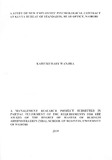| dc.description.abstract | The objective of this study was to establish the types of contracts formed by new employees at Kenya Bureau of Standards. To achieve this objective, data were collected through a survey from all new employees hired between October 2008 and April 2009. Data was collected using a structured questionnaire which was administered through e-mail and drop and pick later basis. Responses were received from seventy two (72) employees from a target of eighty (80), giving a 90 percent response rate.
It was established that all the aspects highlighted as employee-focused obligations scored a mean score of between 3 and 4. This implied that the respondents felt slightly obliged to their employer. The employer-focused obligations scored a mean score of between 1 and 2. This indicates that the respondents strongly agreed or simply agreed. It is important to point out that among the respondents, 66.7 percent were between 26 and 30 years. This comprises of employees at their early career development stage hence the reason for high expectations from the employer. This result to a transactional contract than relational contract among the new employees targeted.
The study established that the contract between the new employees and KEBS is more transactional than relational. It is important therefore, for the management of KEBS to influence the new employees' psychological contract by communicating its un-written offers and expectations to employees as well as giving audience to these employees in order to correct any misconception. This will require the KEBS management to consider employee assistance programs addressing this generation's needs. These can include mortgages, car loans, good medical covers, and opportunity for development. These among others can help retain the new employees and above all develop a sense of continuity which eventually results to the formation of a relational contract. It will also be of importance for a similar study to be carried out after at least two years to establish if the contracts and the factors that contributed to them changed | en_US |

